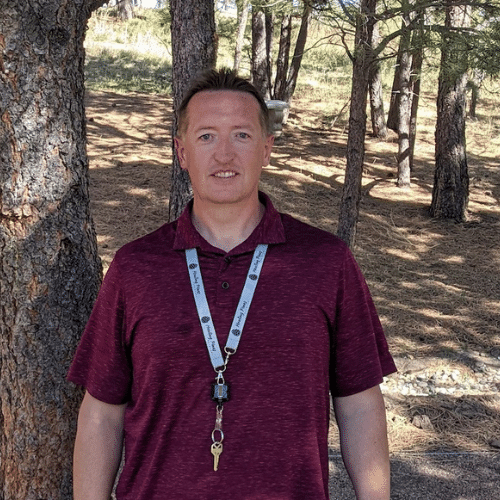Holistic Addiction Treatment
Our rehab facilities are located in Elbert County, one-and-a-half-hour drive from Denver. We go beyond traditional treatment methods of individual and therapy, CBT, DBT, and EMDR. The Healing Pines treatment incorporates alternative therapies such as outdoor therapy and animal-assisted therapy, designed to restore balance, and mindfulness to enhance your overall well-being. Our experienced and compassionate team is committed to crafting personalized treatment plans that address your needs, ensuring the recovery journey is as effective and transformative as possible. We recognize the challenges of overcoming addiction, but with our holistic approach—integrating mind, body, and spirit—you’ll gain the tools and support needed to achieve lasting change and a renewed sense of purpose.
Contact us today!
Request a Confidential Callback
Treating the Mind,
Body & Spirit
Our holistic approach to addiction treatment addresses the entirety person – mind, body, and spirit. We believe that mental well-being, physical fitness, and a healthy diet are essential for sustained recovery. At our rehabilitation for men, we provide opportunities for physical activity and offer a balanced, nutritious diet to help our clients achieve a sense of well-being and energy.
We also incorporate alternative therapies such as acupuncture, massage, and animal-assisted therapy to promote healing and growth. Our equine therapy program is especially effective in helping our clients develop key skills such as accountability, responsibility, confidence, self-control, and problem-solving skills.
Physical Fitness
Both nutrition and fitness are cornerstones for sustained recovery. At our drug rehab in Colorado, we focus on treating the entire person, mind, body, and spirit. Exercise has mental and physical benefits that keep your mind clear and open in your recovery. Exercise increases energy, and enhances mood, which assists in keeping you positive throughout recovery. A balanced, healthy diet with a focus on nutrition can change a person’s sense of well-being and energy. A healthy brain and body enable us to be the best we can be, to be well-rounded individuals in recovery and life in general.


Animal-Assisted Therapy
Working with animals is a fun and calming activity. We all emit energy as do animals, and to get in sync with an animal has great healing properties for ones well being. At our drug rehab for men, we have donkeys and dogs on-site that our clients interact with daily. We also go off-site to visit with more animals. Working with horses, lamas, goats to name a few, and contributing time to animal shelters and all activities that we incorporate at Healing Pines.
Equine Therapy is a kind of Animal-Assisted Therapy in which patients are made to interact with horses. It refers to the therapeutic properties of having guided interactions with the horses facilitated by a professional. Equine therapy helps patients develop key skills such as accountability, responsibility, confidence, self-control, and problem-solving skills.
Don't Let Anything Stop You From Getting Help.
We work with most major commercial insurance plans which can help cover up to 100% of the costs associated with treatment.
Outdoor & Experiential Therapies
We incorporate many outdoor activities in our Active Recovery methods. It is always exciting to show patients how much fun they can have in sobriety, by engaging them in familiar or new experiences. There is a lot to process early on in sobriety, a lot of emotions that had been suppressed come to the surface. Having a positive outlet to express yourself and release built up emotions and energy is crucial to sustain a positive think flow and life style. We have many activities ranging from disc golf, mountain biking, pickle ball, basketball, foosball, pool, and hiking trails, right here, on the 40 acre Ranch.


Mindfulness & Meditation
We have a strong focus on the energy of the groups and the center overall. We practice mindfulness activities throughout the day. Morning and evening meditation, some within a group setting and some on a personals individual time. We have guided meditation, daily reflections, dream interpretation, and other group mindfulness activities that include Outdoor Experiential Therapy, pottery, and art therapy. Expressing yourself through art is a liberating experience and tests our imagination and creativeness.
Being in tune with our body, mind, and spirit, through mediation and mindfulness activities, is crucial for sustained recovery. The better we get to know ourselves and our thought patterns and routines, the easier it is to connect with our foundations in recovery, all that we have learned as tools to help remain sober.
Yoga & Tai Chi
At our holistic rehab center in Colorado, Yoga and Tai Chi is incorporated into our daily routines. Stretching, elongating and engaging muscle groups keeps a healthy flow of blood oxygen to the brain and body, enhancing our well being and emotional, mental capacity. Yoga is not a requirement but is highly encouraged. They are short but powerful mindfulness activities.

Begin Your Transformation
Contact our caring team today to learn more about our program.
The leadership and staff were committed to my success.
Paul is a man of integrity which flows through his team. I have been to other recovery programs and HPR stands far above them all. The small group structure offers a more intimate and personalized experience. This was so much more beneficial to my recovery than facilities preaching a "one-size-fits-all" solution to larger and fragmented groups. It was like having personal and knowledgeable therapists dedicated to me for a full month! They went out of their way to understand the root of my challenges and construct a path for improvement that is unique and relatable to me. This was a huge benefit!
Jay C
It saved my life, in every sense.
I spent a month at Healing Pines Recovery. The actual location itself is unreal. A beautiful cabin lodge, with gorgeous scenery. The rooms are large, queen beds, very comfortable! Great bathrooms with great showers! There is a pool table, slam jam, (Christine! 😉 frisbee golf, and daily access to a nearby gym. The property also has a pickle ball court that was used daily, Zoey the counselor beat us men constantly!
Clay M
My experience with Healing Pines Recovery has been wonderful.
My husband was their client, and they helped him be able to help himself. He is doing amazing! I think the combination of counseling, physical labor, meditation, AA, and just the beauty of the place itself all had a very positive impact on him. They really cared about him, and that did not stop just because he came home. Also they have counseling for the families and it has really helped me a lot. Heather is awesome! I thank God that we had them in our lives when we were most vulnerable.
Susan M
We wanted to share our gratitude to the staff.
Our son was under the care of Healing Pines recently and we wanted to share our gratitude to the staff. There were many challenges in his pursuing treatment, and thankfully Paul and Heather C helped us navigate all of them skillfully with patience and compassion.
Jim E
You'll get your life back!
Healing Pines Recovery is/was instrumental in setting me up for long term success in my recovery journey. I've been to treatment centers in the past and HPR is nothing like anything I've attended before. They're very small, intimate, and hands-on approach to recovery was exactly what I was looking for when seeking treatment. I knew that a large, one size fits all program like those offered by many other treatment centers in Colorado wouldn't provide me with the help I desperately needed. Paul and his Team are incredible and I would highly recommend HPR to anyone who needs help starting their recovery journey. Big shout out to James for all of his guidance during my time at HPR. His grace, knowledge, understanding, and direction were/are key to my continued success in recovery. One HUGE piece of the puzzle I love is the after care I've received from HPR... I am in constant contact with Paul, James, and many other staff members through the their alumni programs and it has helped me so much with life after HPR. This program was truly a miracle in my life and I know it will be for many other men struggling with addiction and/or alcoholism. You'll get your life back!
Nicholas P
This is truly a great recovery facility.
My learning experience here was something I’ll take with me throughout my whole life. The staff here will always be a part of my family and I am beyond thankful for everything they have done and continue to do for my well-being.
Gunnar P
I can't speak more highly of Healing Pines Recovery & Addiction Center.
It is located in a beautiful Colorado location with lots of outdoor activities and fresh air. They have a very knowledgeable and professional staff that goes above and beyond to meet your needs.
Riley K
I couldn’t have been at a more amazing place to begin this journey.
Seriously an amazing place. Everything from how beautiful the house and the property it sits on down to every person staffed there was nothing less than perfect. More than highly recommended in every sense. If you’re reading this and trying to find the right place for treatment and recovery I would absolutely look no further. Everyone’s recovery is different and we all need a comfortable place with people we can trust through this battle, healing pines understood that everyone’s path is different and they 100% cater to that. I couldn’t have been any luckier with finding Healing Pines. I won’t go any deeper and start to thank everyone there individually, But I want to express my gratitude to everyone on the HEALING PINES TEAM. Without you all, my path in sobriety would not look anywhere near the way it looks today. Seriously from the bottom of my heart thank you!
James M
Take the First Step Towards Healing
Our inpatient rehab in Colorado offers an extensive holistic addiction treatment program to help individuals overcome substance use disorder and achieve long-term recovery. Our approach entails treating the whole person, including the mind, body, and spirit, through various evidence-based and alternative therapies. We provide clients with the tools to build a strong foundation for a sober life, including relapse prevention techniques, coping skills, and healthy lifestyle habits. Our compassionate and experienced staff work tirelessly to create an atmosphere of safety, healing, and transformation. If you or someone you love is struggling with addiction, Healing Pines Recovery in Colorado is a wonderful option to consider for a personalized and effective approach to recovery. Remember, help is just a phone call away!
Schedule a Tour Today
Come discover why Healing Pines Recovery is your top choice for men’s addiction treatment.
Begin Your Journey & Escape Addiction
The first step can be the hardest. Fill out the form or call us at (720) 575-2621. You will be connected with a Healing Pines Recovery specialist who can answer your questions and help you get started.
Let Us Help You
Speak to Someone Right Now






